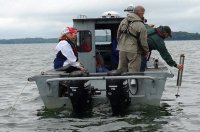PBL Key Piece of Deeper Learning Puzzle
Your content has been saved!
Go to My Saved Content.If your school or district is thinking strategically about preparing students for the future, it's almost certain that you've been having deep conversations about how teaching and learning need to shift. But which shifts matter most? Do you have to invent the future of education for yourself, or are there examples you can consider to help you imagine success?
The Deeper Learning Network an initiative of the William and Flora Hewlett Foundation, represents an ambitious attempt to accelerate the shift.
Defining Deeper Learning
Like all good inquiry projects, the Deeper Learning Network began with a compelling question: In an era of rapid change, how can we prepare students for future careers and for being good citizens in a civil society?
It turns out there are many "right" ways to answer this question.
To find out more about Deeper Learning, I talked with Marc Chun, education program officer for the Hewlett Foundation. He was a speaker at the recent PBL World conference hosted by the Buck Institute for Education in Napa, California.
Chun explained that the Hewlett Foundation's deep dive into research yielded a list of key competencies that are essential preparation for students' future success in careers and civic life. "We focused on critical thinking, problem solving, collaboration, communication, and metacognition -- learning how to learn," he said. Along with these competencies, students also need an academic mindset, which enables them to persist through challenges and develop confidence as learners. All of this sits on a foundation of core academic content. Mastery of content means students are able to transfer their understanding to new situations -- an essential skill in an era of rapid change.
"These competencies are all important," Chun said, and schools need to help students develop in all these areas. When the stars align, a clearer picture of teaching and learning emerges. "We named it Deeper Learning," Chun said.
To learn more about the elements of Deeper Learning, download a copy of Deeper Learning Defined.
The Power of a Network
Deeper Learning isn't a dream for the future. It's already happening -- and not in a one-size-fits-all way. The Deeper Learning Network has identified and connected established school models that exemplify what this vision of teaching and learning is all about. "These models have slightly different flavors," Chun said, "but similar outcomes.
During PBL World, several models that are part of the Deeper Learning Network offered workshops to help conference participants understand how they work.
From listening to presentations by representatives of High Tech High, New Tech Network, Envision, and others, it was clear that project-based learning is another commonality across the Deeper Learning Network. The Buck Institute for Education contributes to the network by providing professional development and defining best practices of PBL.
"By practicing PBL, these schools get students to collaborate, solve problems, communicate effectively, and master academic content," Chun said. "When done well, PBL gives students opportunities to practice the competences that lead to desired outcomes. PBL offers a way to get there."
But there's more going on in Deeper Learning schools than common instructional practices. "PBL is part of a larger set," Chun explained. "These schools also tend to have things like advisories (to foster strong relationships), portfolio assessments, and student-led parent conferences. It adds up to a rich experience, and PBL is part of that."
Another common factor among Deeper Learning Network members is their willingness to share what they know. "Most of our network partners offer tours so you can come see these schools in action," Chun said. Many also provide online libraries that showcase examples of high-quality PBL. (For example, see the Expeditionary Learning Center for Student Work.
The Deeper Learning Network hosted its first conference earlier this year at High Tech High in San Diego, California. "We hope to do that again in 2014," Chun said. Such public events mean that educators outside the network can take part in the continuing conversation about taking learning deeper.
On the Horizon
What's ahead for the Deeper Learning Network? Plenty. Plans under consideration include a Deeper Learning MOOC (massively open online course), with PBL as a key component. Stay tuned for updates.
Meanwhile, proponents of Deeper Learning continue asking hard questions. For example, Chun asks, "How much can you do in isolation? Let's say you have three teachers in a school who are the only ones doing PBL. Can they have the same effect (as a schoolwide Deeper Learning implementation)? That leads to good questions," he says, and the network plans to continue doing research to find good answers.
For more highlights from PBL World conference, which drew 500 educators from around the globe, visit the BIE blog or follow the hashtag #pblworld.
